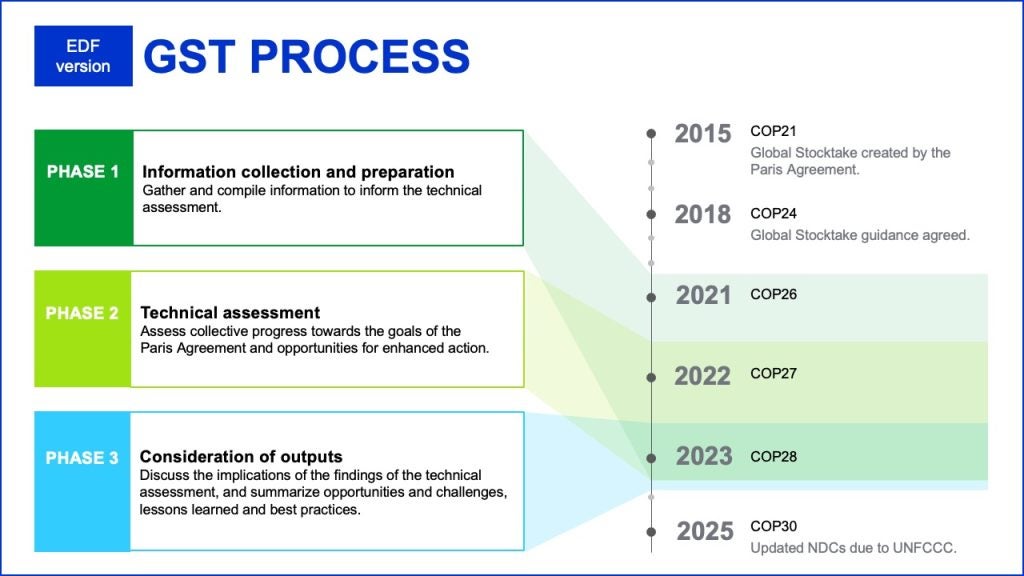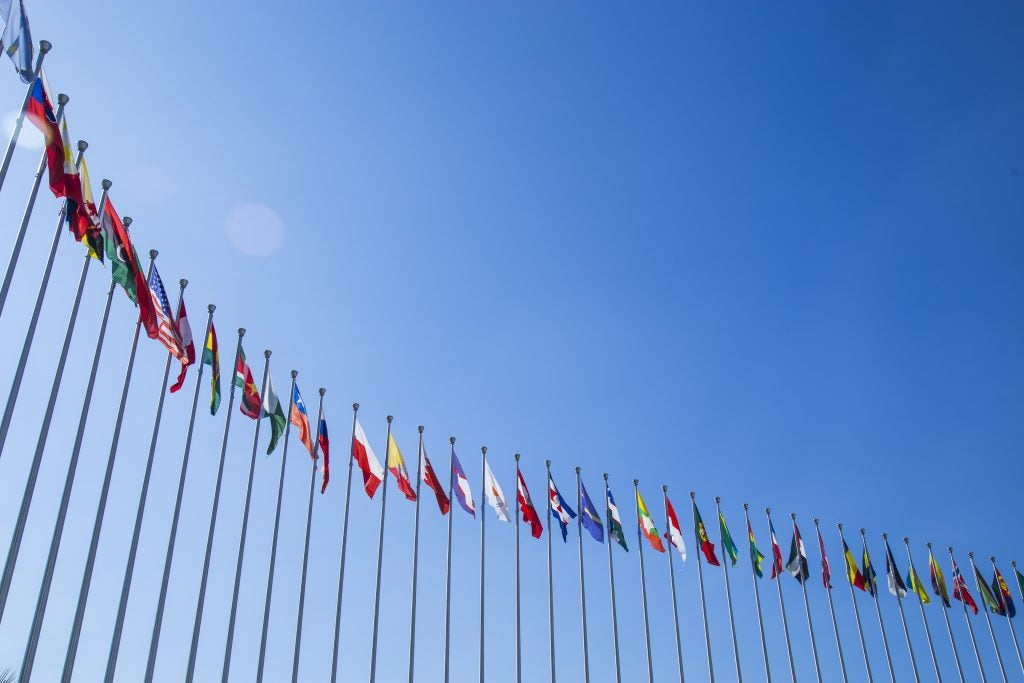EDF’s delegation to the climate talks taking place in Bonn, Germany from June 5 to June 15 give us some insights into the issues they’re following.
Next week, climate negotiators will convene in Bonn, Germany for a two-week negotiation session that will serve as an important marker on the road to the COP28 climate talks in Dubai this November. The outcome of the talks, known as SB58, will set the stage for the negotiations at COP28, giving us an indication of what needs to happen in the months leading up to those pivotal talks.
Every year the climate negotiations become more urgent as we draw closer to the timelines for meeting the Paris Agreement goals. The task is even more challenging when considering the other crises the world faces, like economic disruption, energy insecurity and food scarcity. We need effective solutions that can solve for these multiple challenges simultaneously. The talks in Bonn are an important opportunity to gauge progress and push forward key action points that address these various challenges, in the lead up to COP28, and beyond.
EDF’s delegation to the Bonn climate talks are closely monitoring various important issues inside and around the negotiations. These include the Global Stocktake process, food, fisheries and ocean issues, and efforts to expand high-integrity carbon market cooperation.
The Global Stocktake
The Global Stocktake is a process designed to assess collective progress toward the Paris Agreement’s goals on climate change mitigation, adaptation, and finance. It’s set to conclude at COP28. The outcome of the Stocktake is meant to enhance international cooperation and inform the upcoming round of national climate plans, or nationally determined contributions (NDCs), due in 2025. Properly and objectively implemented, the Stocktake process can translate into climate action and result in more ambitious NDCs.

The three phases of the Global Stocktake process.
What we expect to see in Bonn
The Stocktake will hold its third and final technical dialogue in Bonn, and negotiators will discuss the final outputs of this process.
In the concluding months, these negotiators must be forthright about what is required to close the gap between where we are and where we must be. In doing so, they can help the world radically recalibrate ambition and demonstrate high-level political commitment to transformational climate solutions, such as reducing methane emissions, conserving tropical forests, and rapidly deploying renewable energy technologies to decarbonize electric grids, in a just and equitable manner.
Successful negotiations in Bonn would lay the groundwork for governments, CEOs, researchers, and other stakeholders to leave COP28 with specific and actionable insights on the next steps they can take to achieve collective milestones.
Mandy Rambharos, Vice President for Global Climate Cooperation, and Maggie Ferrato, Manager for Global Climate. EDF and the Center for Climate and Energy Solutions will host “A Solutions-oriented Global Stocktake” on Monday, June 5, 2023 from 14:45 – 16:00 CEST at World Conference Center Bonn. This event will be livestreamed here.
Climate Resilient Food Systems
Current methods of food production contribute significantly to instability, food scarcity and environmental degradation—and climate change is amplifying the crisis.
But there is hope and progress can be made. When food producers adopt climate-resilient, regenerative and environmentally just practices, food production can actually contribute to conservation of land, ocean and water resources and meet the nutrition needs of people around the world, especially those at the front lines of climate change.
What we expect to see in Bonn
In Bonn, negotiators will discuss the new Sharm el Sheikh Joint Work on Implementation of Climate Action on Agriculture and Food Security (SSJW). The SSJW is the continuation of the Koronivia Joint Work on Agriculture (KJWA) and is the only formal mechanism through which UN climate negotiators consider food and agriculture. Negotiators in Bonn will consider submissions and agree on an action plan to guide the implementation of the KJWA and help to monitor progress in the next four years. The action plan will be launched at COP28.
In Bonn, we will be assessing the key elements proposed for the action plan and advocating for an intersessional workshop to continue work on the plan before COP28.
We also will be advocating for the SSJW to include food systems, agroecology, aquatic foods production, land use changes, and healthy diets from sustainable food systems as future topics for discussion.
Finally, as EDF is the co-lead of aquatic food sector under the Marrakech Partnership for Global Climate Action, we will be announcing the updated 2030 aquatic food breakthroughs at the Ocean and Climate Dialogues. These breakthroughs are ocean-based actions and initiatives taken by non-state actors and define pathways to deliver simultaneously on a resilient, nature-positive and net-zero future. They will feed into the discussions of the Global Stocktake to conclude at COP28 and inspire ocean action for the coming years.
Tom Grasso, Vice President for Climate Resilient Food Systems and Karly Kelso, Director for Climate Resilient Food Systems. EDF will host the side event “Strengthening Blue Foods’ Role in National Food Systems to Meet Climate and Nutritional Targets: The ‘Why’ and the ‘How To’” on Monday, June 12 from 10:15-11:45 AM CEST at GIZ Friedrich-Ebert-Allee 32 + 36,53113, Bonn, Germany. To join the event in person please RSVP here.
Fisheries and Oceans
Ocean action is vital in achieving global climate goals and supporting vulnerable coastal communities around the world. It requires bold action and thoughtful stewardship from the global to the local level.
Our fisheries and oceans goal is that by 2030, the oceans provide an equitable lifeline for 500 million people on the front lines of climate change — in the form of resilient food production, enhanced livelihood opportunities and global climate control.
In the lead-up to COP28, it’s critical that the importance of oceans is discussed under both the mitigation and adaptation banners. COP28 will provide a platform for countries to step up in their consideration of oceans and blue food in their contributions under the Paris Agreement.
What we expect to see in Bonn
The second Ocean and Climate Dialogue will happen on the margins of SB58. In it, member states will discuss the ways in which ocean issues can be more prominent in climate discussions.
The Dialogue will include “Coastal ecosystem restoration including blue carbon”, and “Fisheries and food security” as the discussion topics, both of which were EDF recommendations. In Bonn, we will track the discussion, and look for opportunities to shape the debate.
Pedro Zapata, Senior Director, Global Fisheries and Oceans Initiatives.
Natural Climate Solutions
To reach the goals of the Paris Agreement, we need to conserve nature. Natural climate solutions use nature’s powers to stabilize the climate. Policies and financing are needed to scale up the conservation of natural ecosystems, including tropical forests. To have a chance at meeting the goals of the Paris Agreement, we need to halt tropical deforestation by 2030.
High-integrity carbon markets can provide significant support to scale natural climate solutions, including tropical forest conservation. To ensure the integrity of these approaches, it is essential for Indigenous Peoples and local communities to have their voices heard in carbon market governance and decision-making.
What we expect to see in Bonn
At SB58, EDF is advocating for high-integrity, innovative approaches to scale carbon markets at the state, regional and international level. Specifically, we’ll be tracking continued negotiations over Article 6 of the Paris Agreement, which outlines ways that countries can voluntarily cooperate to reduce emissions, generate investment, and support sustainable development.
Countries need to ensure Article 6 is operationalized in a high-integrity, equitable, and transparent manner, and does not exclude the use of high-quality natural climate solutions credits.
The aforementioned Global Stocktake process must consider the critical role of nature in ambitious climate action to achieve the goals of the Paris Agreement.
Breanna Lujan, Senior Manager, Natural Climate Solutions, and Britta Johnston, Senior Policy Analyst, Natural Climate Solutions. EDF will be co-hosting an open reception “Rolling out the Jurisdictional REDD+ Carpet for Carbon Markets” on Wednesday, June 7th at 17:00 CEST. Those interested in attending can register here.
